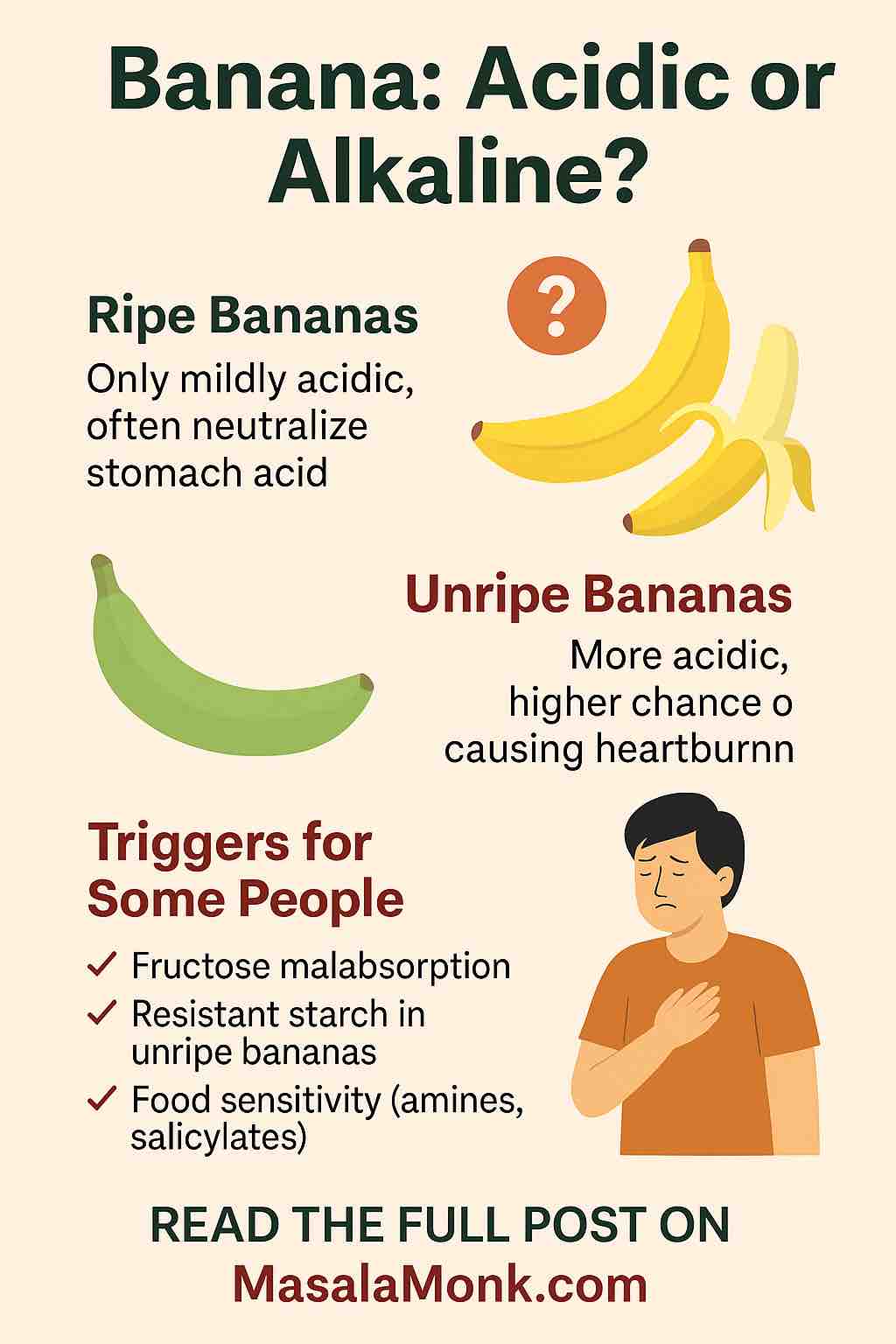
Bananas are one of the most popular fruits worldwide, loved for their sweet taste, convenience, and nutritional value. They’re often recommended as a gentle food for people with digestive problems. However, if you’ve ever eaten a banana and then felt heartburn, you may be wondering: Are bananas really good for acid reflux, or can they sometimes make symptoms worse?
The truth is, bananas can play both roles. Depending on the ripeness of the fruit and your own digestive sensitivity, they might soothe acid reflux in some people while irritating it in others. To clear up the confusion, let’s take a closer look at how bananas interact with reflux and why reactions can vary so much.
📌 Quick Answer: Are Bananas Good or Bad for Acid Reflux?
Ripe bananas are generally low in acid and often soothe reflux by coating the stomach lining and supporting digestion. However, unripe bananas are harder to digest and may trigger bloating or heartburn in sensitive individuals. If you consistently experience reflux after eating bananas, it may be best to limit or avoid them.
According to Medical News Today, foods like bananas, oatmeal, and yogurt may help neutralize stomach acid quickly and provide relief. Want instant relief options beyond bananas? Discover What Foods Neutralize Stomach Acid Immediately for quick, natural fixes.
👉 Bananas and Acid Reflux: Ripe vs. Unripe
| Type of Banana | pH / Digestibility | Effect on Acid Reflux |
|---|---|---|
| Ripe (yellow with brown spots) | Mildly acidic (~5.0–5.5), easy to digest | Usually soothing, reflux-friendly, and gentle on the gut |
| Unripe (green) | Starchy, resistant starch, harder to digest | May trigger gas, bloating, or reflux symptoms |
| Overripe | Softer, sweeter, higher in sugar | Often safe, though may cause bloating in some people |
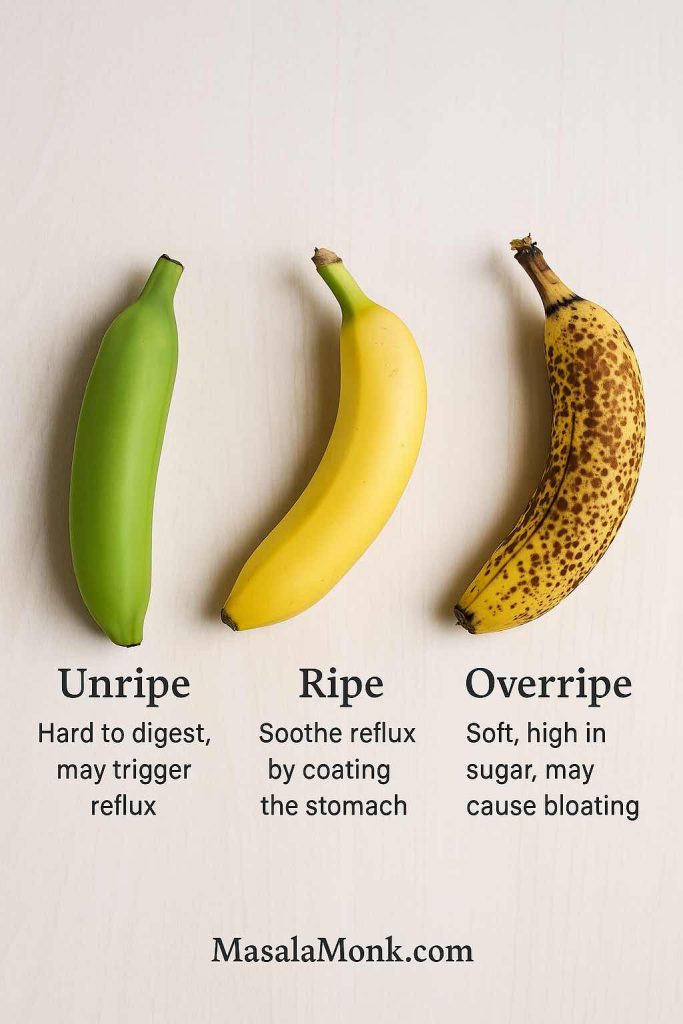
Are Bananas Acidic or Alkaline?
When people ask whether bananas are acidic, they’re usually trying to determine if the fruit might trigger reflux. On the pH scale, ripe bananas typically measure between 5.0 and 5.5, which makes them mildly acidic. Compared to citrus fruits or tomatoes, however, bananas are far less acidic and much gentler on the stomach.
Interestingly, once digested, bananas are considered alkaline-forming. This means they can help neutralize stomach acid in many people. That’s one reason they’re often included in reflux-friendly diets. Harvard Health also lists bananas among non-citrus fruits that are considered safe for people managing GERD.
On the other hand, unripe bananas contain more resistant starch, which slows digestion and can lead to gas, bloating, or reflux in certain individuals.
✅ Takeaway: Ripe bananas are usually gentle and may ease reflux symptoms, while unripe bananas are more likely to cause discomfort. A review on HealthCentral confirms that ripe bananas are low in acid and often recommended for reflux sufferers.
Do Bananas Help With Acid Reflux?
For many people, bananas act almost like a natural antacid. Several unique qualities make them soothing for those with acid reflux:
- High in soluble fiber (pectin): Helps food move smoothly through the digestive tract, reducing the likelihood of acid backing up into the esophagus.
- Contain natural mucilage: This gel-like substance coats the stomach lining and esophagus, which can ease irritation and burning.
- Offer prebiotic benefits: Bananas support healthy gut bacteria, which play a role in better digestion and overall gut balance.
Research published on PMC (NIH) notes that bananas contain pectin and other compounds that help food move smoothly through the digestive tract, reducing the chance of reflux.
Because of these benefits, doctors often recommend bananas as one of the first fruits to reintroduce when following a GERD-friendly diet. Johns Hopkins Medicine also recommends alkaline foods like bananas, melons, and nuts as part of a reflux-friendly diet.
Can Bananas Cause Heartburn?
Although bananas are widely considered safe, they can still cause heartburn in some people. Several factors may explain why:
- Fructose malabsorption: For individuals who struggle to absorb natural fruit sugars, bananas may ferment in the gut, leading to bloating, gas, and reflux.
- Unripe bananas: These are harder to digest because of their high starch content, which may slow gastric emptying and increase reflux risk.
- Food sensitivities: A small group of people are sensitive to compounds in bananas (like amines or salicylates), which can mimic reflux or indigestion symptoms.
Bananas aren’t the only foods that can surprise you. See our full list of Foods that Worsen Acid Reflux and Heartburn so you know what else to watch out for.
👉 In short, bananas are safe for most people, but they can act as a genuine trigger for some.
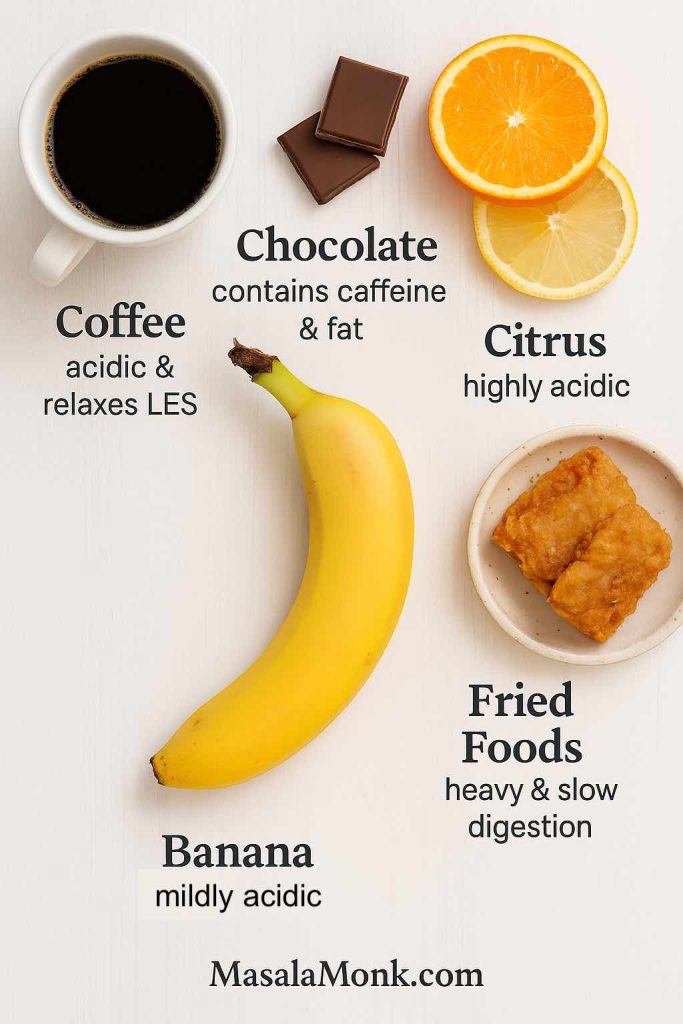
Why Do Bananas Give Me Heartburn?
If bananas seem to trigger reflux for you, it doesn’t necessarily mean the fruit itself is “bad.” Instead, it could be related to timing, quantity, or your own digestive health:
- Underlying GERD: If you already have chronic acid reflux, your digestive system may simply be more sensitive.
- Eating on an empty stomach: For some people, eating bananas alone may temporarily increase stomach acid.
- Large portions or poor food combinations: Eating several bananas at once, or pairing them with other trigger foods like chocolate or fatty meals, may worsen symptoms.
In other words, bananas aren’t always the problem—the way you eat them may be the real culprit.
How to Eat Bananas for Acid Reflux Relief
If you’d like to keep bananas in your diet without discomfort, here are some practical tips:
- ✅ Choose bananas that are fully ripe (bright yellow with brown specks).
- ✅ Pair bananas with low-acid foods like oatmeal, almond butter, or plain yogurt.
- ✅ Avoid eating bananas first thing in the morning on an empty stomach.
- ✅ Start with small portions—such as half a banana—to test your tolerance.
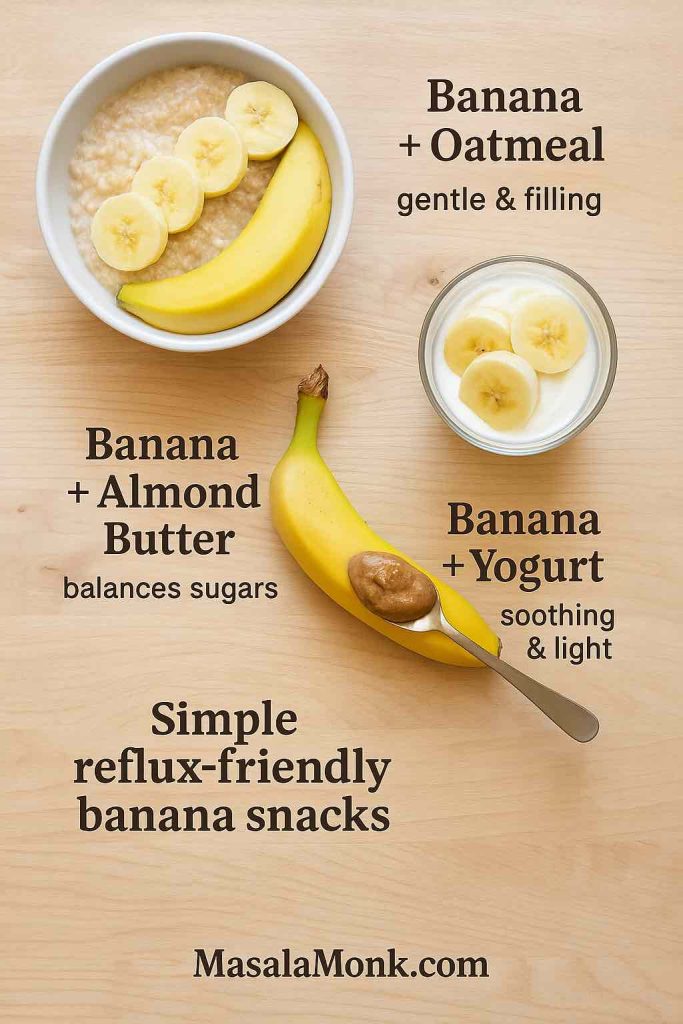
Looking for other alkaline, stomach-friendly choices? Our article on the 5 Best Alkaline Foods for Acid Reflux highlights more fruits and foods that soothe reflux naturally.
By making these small adjustments, many people can continue enjoying bananas without triggering reflux.
When to Avoid Bananas
Although bananas are safe for most, you may want to cut back or avoid them if:
- You consistently notice heartburn or reflux after eating them.
- You are in the middle of a GERD flare-up.
- You eat a lot of unripe or processed banana-based products (like chips, smoothies, or desserts).
If bananas don’t sit well with you, there are plenty of soothing alternatives: papaya, melons, oatmeal, and aloe juice are all known for helping with acid reflux. Check out our guide on Foods That Help with Acid Reflux and Heartburn for more gentle options to ease digestion.
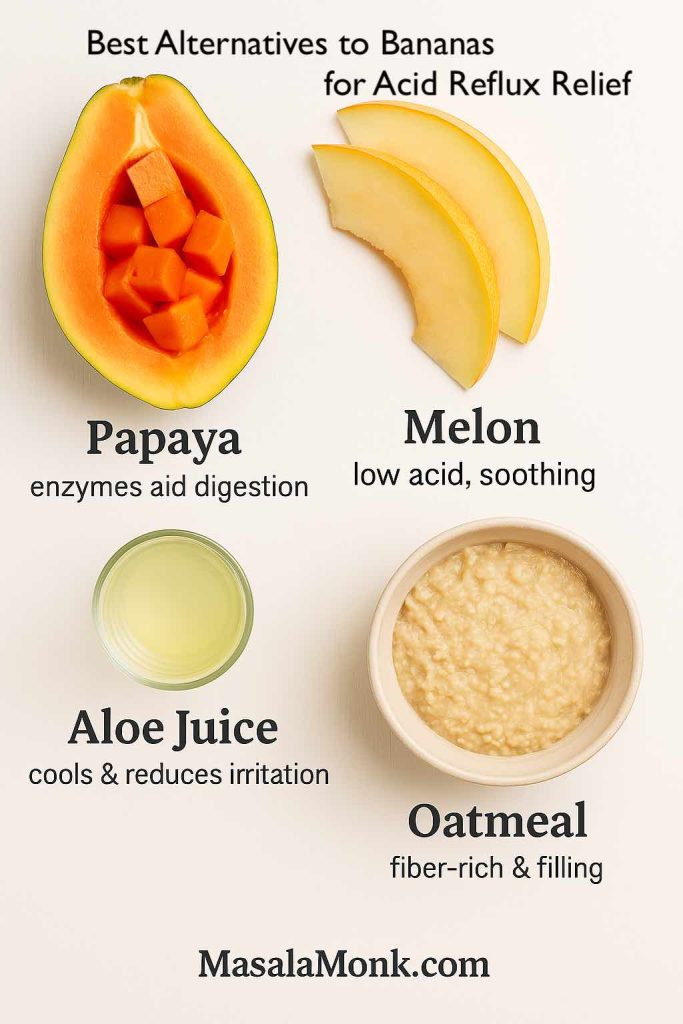
What Doctors and Research Say About Bananas and GERD
Most doctors and nutrition experts classify bananas as a safe, low-acid fruit for people with reflux. Unlike acidic foods such as citrus or tomatoes, bananas do not weaken the lower esophageal sphincter (LES)—the muscle that prevents stomach acid from flowing back into the esophagus.
That said, clinical studies specifically focused on bananas and reflux are limited. Much of what we know comes from patient experiences and broader dietary recommendations. As a result, medical advice often varies: some patients report bananas as soothing, while others find they worsen symptoms. However according to Consensus, scientific reviews suggest banana pulp may increase protective mucus in the stomach lining and support healing of gastric tissue.
For a more holistic approach, explore our detailed guide on 21 Remedies for Acid Reflux, Heartburn, and GERD — it covers lifestyle tips, natural remedies, and diet hacks that go beyond bananas.

Bottom Line — Bananas and Acid Reflux
- Are bananas acidic? Slightly, but they become alkaline-forming once digested.
- Do bananas help with acid reflux? Often yes, thanks to their fiber and soothing properties.
- Can bananas cause heartburn? Yes, especially when unripe or eaten in excess.
- Should you avoid bananas? Only if you notice consistent symptoms after eating them.
👉 For most people, bananas can be part of a reflux-friendly diet. However, if you’re sensitive, listen to your body and adjust accordingly.
🙋 Frequently Asked Questions About Bananas and Acid Reflux
1. Can bananas cause heartburn?
Yes, they can. While ripe bananas are usually soothing, some people experience heartburn due to unripe bananas, food sensitivities, or eating them on an empty stomach. In other words, it depends on your body’s unique reaction and the ripeness of the fruit.
2. Are bananas good for acid reflux?
For many people, yes. Bananas are considered low-acid, and their fiber and natural coating effect can ease reflux symptoms. However, if you notice discomfort, it may be worth adjusting when or how you eat them.
3. Why do bananas give me heartburn sometimes?
There are several possible reasons. For example, eating unripe bananas, having underlying GERD, or consuming large portions can all contribute to reflux. In addition, combining bananas with trigger foods (like chocolate or fatty meals) may make symptoms worse.
4. Are bananas acidic or alkaline?
Technically, bananas are mildly acidic with a pH around 5.0–5.5. However, once digested, they act as an alkaline-forming food, which is why they’re often recommended for people with acid reflux.
5. Is banana good for GERD?
Yes, bananas are usually considered GERD-friendly because they don’t relax the lower esophageal sphincter (LES) and are low in acid. That said, everyone is different, so it’s best to test your own tolerance.
6. Do bananas help heartburn right away?
Sometimes they do. Because of their soothing texture and fiber content, a ripe banana may calm mild heartburn fairly quickly. However, the effect is not guaranteed, and for some people, bananas may actually worsen symptoms.
7. Can eating bananas on an empty stomach cause reflux?
It can for certain individuals. While many tolerate bananas well in the morning, others find that eating them on an empty stomach increases stomach acid and leads to heartburn. A simple fix is to pair bananas with oatmeal, yogurt, or almond butter.
8. Which type of banana is best for acid reflux?
Ripe bananas (yellow with brown spots) are usually the safest choice. They are easier to digest and less likely to trigger reflux compared to unripe green bananas, which contain more resistant starch.
9. How many bananas can I eat if I have acid reflux?
Moderation is key. One banana per sitting is usually well tolerated, but eating several at once—or combining them with other trigger foods—may increase reflux risk. It’s best to start small and see how your body responds.
10. What can I eat instead of bananas for reflux relief?
If bananas don’t sit well with you, don’t worry—there are plenty of alternatives. Papaya, melons, oatmeal, and aloe vera juice are all soothing, low-acid options that many people with reflux find helpful.









